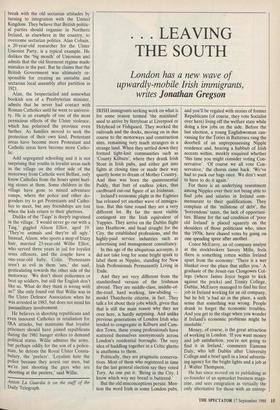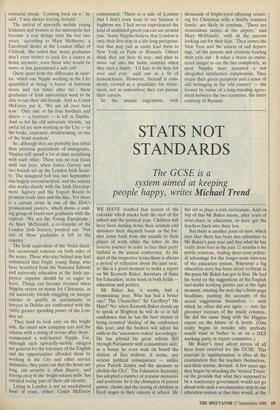. . . LEAVING THE SOUTH
London has a new wave of upwardly-mobile Irish immigrants,
writes Jonathan Gregson IRISH immigrants seeking work on what is for some reason termed 'the mainland' used to arrive by ferryboat at Liverpool or Holyhead or Fishguard. They worked the railroads and the docks, moving on in due course to the motorways and construction sites, remaining very much strangers in a strange land. When they settled down they formed tight-knit communities such as `County Kilburn', where they drank Irish Stout in Irish pubs, and either got into fights at closing time or made their way quietly home to dream of Mother Country. And thus was born the quintessential Paddy, that butt of endless jokes, that cardboard cut-out figure of an Irishman.
Ireland's economic plight in the Eighties has released yet another wave of immigra- tion. But this time round they are a very different lot. By far the most visible contingent are the Irish equivalent of Yuppies. They arrive on the Dublin flight into Heathrow, and head straight for the City, the established professions, and the highly-paid service industries such as advertising and management consultancy.
In this age of the ubiquitous acronym, it did not take long for some bright spark to label them as Nipples, standing for New Irish Professionals Permanently Living in Exile.
And they are very different from the standardised version of the Irishman abroad. They are middle-class, middle-of- the-road, hard working, law-abiding model Thatcherite citizens, in fact. They talk a lot about their jobs which, given that that is still the main reason why they are over here, is hardly surprising. And unlike previous generations of London Irish who tended to congregate in Kilburn and Cam- den Town, these young professionals have scattered themselves anonymously across London's residential boroughs. The very idea of huddling together in a Celtic ghetto is anathema to them.
Politically, they are pragmatic conserva- tives. Most of them who registered in time for the last general election say they voted Tory. As one put it: 'Being in the City, I know which way my bread is buttered.'
But the old misconceptions persist. Men- tion the word Irish in some London pubs, and you'll be regaled with stories of former Republicans (of course, they vote Socialist over here) living off the welfare state while doing a few jobs on the side. Before the last election, a young Englishwoman can- vassing for the Tories in Battersea rang the doorbell of an unprepossessing Nipple residence and, hearing a hubbub of Irish accents within, meekly enquired whether `this time you might consider voting Con- servative'. 'Of course we all vote Con- servative,' the chorus came back. 'We've had to pack our bags once. We don't want to have to do it again.'
For there is an underlying resentment among Nipples over their not being able to find jobs and salaries in Ireland com- mensurate to their qualifications. They complain of the 'millstone of debt', the `horrendous' taxes, the lack of opportuni- ties. Blame for the sad condition of 'poor old Ireland' is placed squarely on the shoulders of those politicians who, since the 1970s, have chased votes by going on one spending spree after another.
Conor McEnroy, an oil company analyst at the stockbrokers Savory Milln, feels there is something rotten within Ireland apart from the economy: 'There is a wet blanket over the place that stifles you.' A graduate of the Jesuit-run Clongowes Col- lege (where James Joyce began to kick against the pricks) and Trinity College, Dublin, McEnroy managed to find his first job in Ireland working for an oil company, but he felt 'a bad air in the place, a sixth sense that something was wrong. People drank to forget the economic troubles. And you get to the stage when you wonder if Ireland's economic problems might be insoluble.'
Money, of course, is the great attraction of working in London. `If you want money and job satisfaction, you're not going to find it in Ireland,' comments Eamonn Daly, who left Dublin after University College and a brief spell in a local advertis- ing agency for the bright lights and a job at J. Walter Thompson.
He has since moved on to publishing as co-founder of an upmarket business maga- zine, and sees emigration as virtually the only alternative for those with an entrep- reneurial streak. 'Looking back on it,' he said, 'I was always leaving Ireland.'
The arrival of upwardly mobile young Irishmen and women in the metropolis has become 'a real deluge over the last two years,' according to Mary McSherry, a Eurobond dealer at the London office of Citibank. She noted that 'many graduates don't even bother to look for a career at home anymore, even those who would be more or less guaranteed a safe job'.
Quite apart from the difference in salar- ies, which one Nipple working in the City quantified as being 'a factor of between seven and ten times after tax', these graduates of Irish universities want to be able to see their old friends. And as Conor McEnroy put it, 'We are all over here now.' Only one of his four brothers and sisters — a barrister -- is left in Dublin. And as for his old university friends, 'an awful lot are now working in the City — in the banks, insurance, stockbroking, or one of the bond markets'.
So, although they are probably less tribal than previous generations of immigrants, Nipples still spend a lot of time socialising with each other. There was no real focus until last year, when James Garvey and two friends set up the London Irish Socie- ty. The inaugural ball was last September was hugely oversubscribed, and the society also works closely with the Irish Develop- ment Agency and the Export Board to promote trade fairs and the like. Yet there is a certain irony in one of the IDA's promotional posters, which shows a smil- ing group of brand new graduates with the caption: 'We are the Young Europeans.' As Mary McDonald, a co-founder of the London Irish Society, pointed out: 'Not one of those graduates is left in the country.' The Irish equivalent of the 'brain drain' has occasioned remorse on both sides of the water. Those who stay behind may feel embittered that bright young things who have benefited from the National Schools and university education at the Irish tax- payers' expense should be so eager to leave. Things can become strained when Nipples return en masse for Christmas, as old university friends stuggling on meagre salaries to qualify as accountants or lawyers in Dublin are confronted with the vastly greater spending power of the Lon- don set.
'They tend to look only on the bright side, the smart new company cars and the salaries with a string of zeroes after them,' Commented a well-heeled Nipple. For, although such upwardly-mobile emigres are grateful for the tolerance of the English and the opportunities afforded them by working in the City and other service industries, they point out that the hours are long, job security is often illusory, and slaving away in the 'bright satanic mills' has entailed losing part of their old identity.
Living in London is not an unadultered bowl of roses, either. Conor McEnroy commented: 'There is a side of London that I don't even want to see because it frightens me. I had never experienced the kind of undiluted greed you can see around you.' Some Nipples believe that London is only their first stop in a life-long peregrina- tion that may just as easily lead them to New York or Paris or Brussels. Others think they are here to stay, and plan to move out into the home counties when they start a family. 'I'd hate to be here for ever and ever,' said one in a fit of homesickness. However, Ireland is com- monly viewed as a possibility for retire- ment, not as somewhere they can pursue their careers.
So the annual migrations. with thousands of bright-eyed offspring return- ing for Christmas with a briefly reunited family, are likely to continue. 'There are tremendous scenes at the airport,' said Mary McDonald, 'with all the parents looking out for their kids.' Then comes the New Year and the season of sad depart- ings, 'all the parents and relations bawling their eyes out'. It takes a brave or embit- tered emigre to cut the ties completely, so most Nipples have accepted a not altogether satisfactory compromise. They retain their green passports and a sense of still belonging in the 'old country' — the former by virtue of a long-standing agree- ment between the two countries, the latter courtesy of Ryanair.



































































 Previous page
Previous page